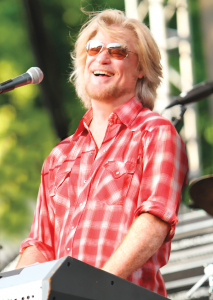Still Rockin’
Hall & Oates plays Orlando this month, and Daryl Hall is here to discuss the band’s longevity.
 Hall & Oates are legends in the music industry, widely regarded around the world for their soulful pop sound that has captivated multiple generations. In addition to a string of chart-topping hits throughout their career like “Maneater” and “Private Eyes,” the group has seven platinum albums to their credit. In 2011, they were proudly elected as members of the Rock and Roll Hall of Fame. They have a star on the Hollywood Walk of Fame and the Recording Industry Association of America once named them the most successful duo in rock history.
Hall & Oates are legends in the music industry, widely regarded around the world for their soulful pop sound that has captivated multiple generations. In addition to a string of chart-topping hits throughout their career like “Maneater” and “Private Eyes,” the group has seven platinum albums to their credit. In 2011, they were proudly elected as members of the Rock and Roll Hall of Fame. They have a star on the Hollywood Walk of Fame and the Recording Industry Association of America once named them the most successful duo in rock history.
On June 9, the duo will roll into Orlando’s Amway Center for a stop on their current tour with 1980s hitmakers Tears for Fears. We caught up with Hall ahead of the big show and he shared his thoughts on the group’s longevity, his battle with Lyme disease and some of his favorite moments from a lifetime of memories.
ORLANDO FAMILY MAGAZINE: So you recently kicked off your latest tour, is that something you always look forward to?
DARYL HALL: Yeah it is actually, I’ve been off for a few months and [I was] anxious to get out there. It’s a pretty extensive tour, but you know I miss the stage to tell you the truth.
OFM: After all these years, what motivates you guys to still hit the road as much as you do?
DH: It’s compulsion, it is what I do. I was made to sing; born to sing. You can’t ask a bird to stop singing.
OFM: After all these years, is there still a different energy when you guys play in front of your devoted fans? Do you feed off it at all?
DH: It’s different; it’s like playing in front of your cousins. I feel like everyone is related to me in the audience. It’s a comfortable and unusual feeling.
OFM: With such a vast catalog, you know you have to play the hits, but how do you work in some deeper tracks, things that you guys like as much as the singles?
DH: You definitely have to work a balance. There are certain songs that are actually required, you [have to perform] them. This tour we are adding some songs we maybe never played or haven’t played in decades so that keeps it interesting for everyone and we’ve changed up some of the arrangements; it’s definitely a different show.
OFM: What was it like being around the heyday of The Sound of Philadelphia and being a part of such an iconic moment in music history? Did that help push you in a certain direction in your career?
DH: Yes. I’m first and foremost a Philly musician; my whole style is about growing up in the Philly area. I started with all the people that created [The Sound of Philadelphia], from Chubby Checker to Gamble and Huff. These are the people I began with. I’m part of that, that’s what I do.
OFM: Your mother was a vocal teacher. What kind of influence did she have on you musically?
DH: She was a choir director. She didn’t influence my singing style; I got all that from the music I listened to. She was into her generation of music, a lot of musicals. I did have some training in classical music. She is such a great singer—93 years old and can still sing and she definitely influenced me in the way I approach my voice.
OFM: You are playing the Amway Center this month. People always associate Orlando with tourism, but there are plenty of people who actually call it home. Do you ever notice a difference when you have a bit of a mixed crowd?
DH: I guess it is, I never really think about much. I don’t know that I ever noticed if it affected the vibe. I just know they like my sax player because he’s from Orlando.
OFM: What about Live From Daryl’s House, can we expect some new episodes anytime soon?
DH: Working on it, I think I’m going to make some changes. The TV business is in flux; we are deciding where we want to go with the show.
OFM: I love the vibe of the show because I feel like it peels back the curtain on how musicians interact in a creative space. As the show has evolved over the years, what has been the most rewarding aspect of it for you personally?
DH: Just the constant surprises of the show, you never know what’s going to happen. Most of the show is first dates. Most of the time it’s people I don’t know so it really makes you stay on your toes. The food isn’t bad either.
OFM: You’re on the new Todd Rundgren album, an artist with whom you have a history. What can you share about the collaboration?
DH: He emailed me and said I’m doing a collaboration album and [asked if I felt] like participating and I said sure. He sent me a track and I wrote the melody and music and gave it back to him and he altered it and sent it back to me. Then I made some changes and sent it back to him and it went like that over a period of time. I think it turned out great.
OFM: Recording in a studio these days is so different from when you started, do you embrace the new technology and way of doing it?
DH: I could do it any way. My new solo record, I put the whole band in a room and we just banged it out, but I haven’t done that in years.
OFM: You’ve been very vocal in helping create awareness about Lyme disease. As a person who has lived with the disease, what do you wish more people knew about it?
DH: I can’t stress enough that if you’ve been bit by a tick, any doctor that tells you there’s no such thing as chronic Lyme disease, walk away and find a doctor that will accept that reality. You can find them. That’s the most important thing, if you don’t treat it, it will change your life in bad ways. You have to find someone to help you address it. It’s not curable but it’s easily maintained. I don’t really even have it any longer. Every once in a while it flares up, but it’s not a big deal for me anymore.
OFM: You and John have been playing since the early ’70s. You’ve had No. 1 records, platinum albums, are inductees into the Rock and Roll Hall of Fame and so on. What speaks more to you, the level of success achieved or the fact that you have had this amazing longevity?
DH: I think we are both individually blessed with this will to survive and work within situations. We get along, we are brothers, we don’t get in each other’s way. And we have our own individual worlds we exist in. We have a diversity in our music, we like a lot of things and we can do a lot of things in music that has this timeless quality to it.
This article originally appeared in Orlando Family Magazine’s June 2017 issue.











